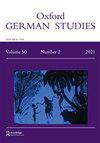赫尔辛基就是我们
IF 0.1
3区 文学
0 LITERATURE, GERMAN, DUTCH, SCANDINAVIAN
引用次数: 0
摘要
二战后欧洲社会主义国家的被迫一体化通常被视为政治误解和真正的社会失败的历史。从早期现代主义和先锋主义时期开始,社会主义也是整个东欧和中欧的共同经历。自20世纪50年代末以来,社会主义政党文化部门、个别国家文化部、作家协会、出版商或文学期刊之间的关系日益密切,导致了迄今为止不为人知的跨国文学流通。本文分析了民主德国文学体系与欧洲东方集团的文学和文学机构之间的跨国联系。本文旨在探讨两个具体的研究问题。首先,对GDR中发表的国际文献进行了统计研究,并对跨国籍的普遍概念和实践进行了研究。其次,介绍了社会主义文学策划的跨国网络化场所。保存在东德档案馆的文件构成了研究的基础。本文章由计算机程序翻译,如有差异,请以英文原文为准。
‘Helsinki sind wir’: Sozialistische Transnationalität im Literaturbetrieb der DDR
The forced integration of European socialist states following WWII is usually viewed as a history of political misunderstandings and genuine social failures. From the early modernism and avant-garde periods onwards, socialism was also a common experience for the whole of East and Central Europe. Since the late 1950s, the densifying network of relations among culture departments of socialist parties, culture ministries of individual countries, writer associations, publishers or literary journals has resulted in thus far unknown transnational literature circulation. This article analyzes the transnational links between the GDR literary system and the literatures and literary institutions of the European Eastern Bloc. The paper aims to discuss two specific research questions. First, the international literature published in the GDR is examined statistically and regarding the prevailing concepts and practices of transnationality. Second, the transnationally networked places of socialist literature planning are presented. Documents preserved in East German archives form the basis for the research.
求助全文
通过发布文献求助,成功后即可免费获取论文全文。
去求助
来源期刊

OXFORD GERMAN STUDIES
LITERATURE, GERMAN, DUTCH, SCANDINAVIAN-
CiteScore
0.10
自引率
50.00%
发文量
2
期刊介绍:
Oxford German Studies is a fully refereed journal, and publishes in English and German, aiming to present contributions from all countries and to represent as wide a range of topics and approaches throughout German studies as can be achieved. The thematic coverage of the journal continues to be based on an inclusive conception of German studies, centred on the study of German literature from the Middle Ages to the present, but extending a warm welcome to interdisciplinary and comparative topics, and to contributions from neighbouring areas such as language study and linguistics, history, philosophy, sociology, music, and art history. The editors are literary scholars, but seek advice from specialists in other areas as appropriate.
 求助内容:
求助内容: 应助结果提醒方式:
应助结果提醒方式:


